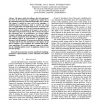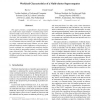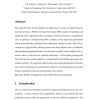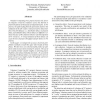874 search results - page 53 / 175 » On Advantages of Grid Computing for Parallel Job Scheduling |
PDP
2009
IEEE
14 years 2 months ago
2009
IEEE
—this paper studies the influence that task placement may have on the performance of applications, mainly due to the relationship between communication locality and overhead. Thi...
JSSPP
2007
Springer
14 years 1 months ago
2007
Springer
Performance evaluation in multi-cluster processor co-allocation - like in many other parallel job scheduling problems- is mostly done by computing the average metric value for the ...
JSSPP
2004
Springer
14 years 1 months ago
2004
Springer
This paper presents a comprehensive characterization of a multi-cluster supercomputer1 workload using twelvemonth scientific research traces. Metrics that we characterize include...
AES
2006
Springer
13 years 7 months ago
2006
Springer
This paper describes the development and application of a piece of engineering software that provides a Problem Solving Environment (PSE) capable of launching, and interfacing wit...
CCGRID
2009
IEEE
14 years 2 months ago
2009
IEEE
Volunteer Computing (VC) projects harness the power of computers owned by volunteers across the Internet to perform hundreds of thousands of independent jobs. In VC projects, the ...




